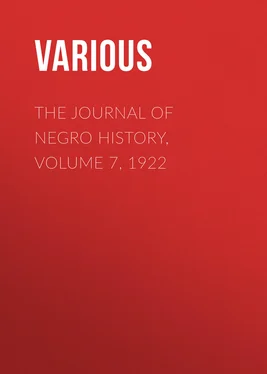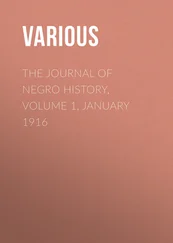Various - The Journal of Negro History, Volume 7, 1922
Здесь есть возможность читать онлайн «Various - The Journal of Negro History, Volume 7, 1922» — ознакомительный отрывок электронной книги совершенно бесплатно, а после прочтения отрывка купить полную версию. В некоторых случаях можно слушать аудио, скачать через торрент в формате fb2 и присутствует краткое содержание. Жанр: foreign_antique, periodic, История, foreign_edu, на английском языке. Описание произведения, (предисловие) а так же отзывы посетителей доступны на портале библиотеки ЛибКат.
- Название:The Journal of Negro History, Volume 7, 1922
- Автор:
- Жанр:
- Год:неизвестен
- ISBN:нет данных
- Рейтинг книги:3 / 5. Голосов: 1
-
Избранное:Добавить в избранное
- Отзывы:
-
Ваша оценка:
- 60
- 1
- 2
- 3
- 4
- 5
The Journal of Negro History, Volume 7, 1922: краткое содержание, описание и аннотация
Предлагаем к чтению аннотацию, описание, краткое содержание или предисловие (зависит от того, что написал сам автор книги «The Journal of Negro History, Volume 7, 1922»). Если вы не нашли необходимую информацию о книге — напишите в комментариях, мы постараемся отыскать её.
The Journal of Negro History, Volume 7, 1922 — читать онлайн ознакомительный отрывок
Ниже представлен текст книги, разбитый по страницам. Система сохранения места последней прочитанной страницы, позволяет с удобством читать онлайн бесплатно книгу «The Journal of Negro History, Volume 7, 1922», без необходимости каждый раз заново искать на чём Вы остановились. Поставьте закладку, и сможете в любой момент перейти на страницу, на которой закончили чтение.
Интервал:
Закладка:
At Eagle, not far from Montgomery, there settled groups of Negroes sufficiently large to necessitate educational facilities for their children. A large one-room school followed and this had not been established very long before it was necessary to employ two teachers. Among the prominent laborers in this field were Mrs. Mary Wilson-Johnson and Mrs. A. G. Payne. This work experienced most extensive growth under the direction of Miss A. L. Norman, Miss M. E. Shelton and Mr. A. C. Page.
There soon followed schools at Fire Creek, Hawk's Nest, Stone Cliff, Nuttallburg, Sewell, Fayetteville, and elsewhere in Fayette County. Prominent among the teachers serving in these towns were D. W. Calloway, A. T. Calloway, Miss L. E. Perry, Mrs. Lizzie Davis, Miss Bertha Morton, Mr. James Washington, Mrs. F. Donnelly Railey, Mrs. H. C. A. Washington, Mrs. J. B. Jordan-Campbell, C. G. Woodson, and Mrs. E. M. Dandridge. These teachers did not generally serve a long period in any one place, as there was a difference in salary in various districts and the best teachers usually sought the most lucrative positions; and sometimes, in the battle for bread and butter, the rather keen competition in certain districts led to the periodical dismissal of teachers without justifiable cause.
To those mentioned above, however, is due the credit for the development of the Negro schools in Fayette County. This is especially true of Mrs. E. M. Dandridge, who doubtless had a more beneficent influence in Fayette County than any teacher of color who toiled there. She taught for twenty-five years at Quinnimont, where she was not only a teacher but a moving spirit in all things promoting the social, moral, and religious welfare of the Negroes of her own and adjacent communities. She was fortunate in having a natural endowment superior to that of most persons and enjoyed, moreover, educational advantages considered exceptional for most Negroes of that day. She still lives to continue a noble work well begun and to complete a useful career in the same county where she cast her lot years ago.
For almost a generation earlier than this, Negro education had been launched with much better beginnings in the county of Kanawha. There were no free schools in West Virginia until 1866, but as in the case of several other settlements in the State, private schools were conducted for Negroes immediately after their emancipation. There had come into the county of Kanawha Rev. F. C. James, an Ohio Negro, the father of C. H. James, the wealthy wholesale produce merchant of Charleston. This pioneer was a man of fundamental education and unusual native ability. He opened at Chapel Hollow, or Salines, two and one-half miles from Malden, in 1865, probably the first Negro school in the Kanawha Valley. He thereafter taught elsewhere and later became the founder of the First Baptist Church of Charleston. The following year Miss Lucy James from Gallia County, Ohio, opened the first Negro school in Charleston. Among the first patrons were Matthew Dillon, Lewis Rogers, Alexander Payne, Lewis Jones, Perry Harden, Julius Whiting, and Harvey Morris. Mrs. Landonia Sims had charge of the school one year also. At this time Rev. Charles O. Fisher, a Methodist Episcopal minister of Maryland, had a private and select school which was later merged with the free public school. Between 1866 and 1869 Rev. J. W. Dansberry, another Methodist Episcopal minister from Baltimore, Maryland, belonging as did Mr. Fisher to the Washington Conference, served also as a teacher while preaching in this State. The Simpson M. E. Church, their main charge, was being developed during these years and was in 1867 housed in a comfortable building on Dickinson and Quarrier Streets. Mr. C. O. Fisher was a well-educated man, but Mr. Dansberry depended largely on natural attainments.
Rev. I. V. Bryant, who has toiled for many years in the Ohio Valley as a Baptist minister, started his public career as a teacher at Baker's Fort school, about two and one-half miles from Charleston. Rev. Harvey Morris, another minister, opened a public school at Sissonsville in 1873, Rev. J. C. Taylor another at Crown Hill in 1882, and not long thereafter this school was attended by such distinguished persons as Mrs. M. A. W. Thompson and Dr. A. Clayton Powell of New York City. This work in Kanawha County was accelerated too by the assistance from the Freedmen's Bureau which sent to this section C. H. Howard, brother of Gen. O. O. Howard, the head of the Freedmen's Bureau, to inspect the field, and later sent one Mr. Sharp to teach in Charleston. 46
One of the first schools in Kanawha County was organized at Malden. Immediately after the Civil War this town had a much larger and more promising Negro population than the city of Charleston. Many Negroes had been brought to Kanawha County, and after their freedom many others came to labor in the salt works. This private school at Malden was conducted by Mr. William Davis, the first teacher of Booker T. Washington, who a few years before had come from Halesford, Virginia, to Malden.
Mr. Davis's career is more than interesting. He was born in Columbus, Ohio, November 27, 1848, remained there until his thirteenth year, spending parts of the years 1861, 1862, 1863 in Chillicothe. During these years he mastered the fundamentals of an English education. He moved back to Columbus in the fall of 1863. On December 18th of that year Mr. Davis enlisted in the Union "Light Guard," called "Lincoln's Body Guard," at Columbus. He served in the army eighteen months and was discharged at Camp Todd Barracks, Washington, D. C., June 24, 1865. He then returned to Columbus and after remaining there about a month went to Cincinnati, from which he proceeded to run on a boat from Gallipolis to Charleston for about a month.
About this time the people of Malden, under the wise guidance of Lewis Rice, a beloved pioneer minister, better known among the early Negroes of the State as Father Rice because of his persistent efforts in behalf of religion and education, had decided to establish a school for the education of their children. Mr. William Davis thereupon abandoned his work on the boat and became the teacher of this private school, established at Malden in the home of Father Rice, in 1865. As the school had to be conducted in the very bed-room of this philanthropist, it was necessary for him to take down his bed in the morning and bring in the benches, which would be replaced in the evening by the bed in its turn. The school was next held in the same church thereafter constructed, and finally in the schoolroom provided at public expense, as one of the schools of the county.
About the only white person who seemed to give any encouragement to the education of Negroes at Malden was General Lewis Ruffner. It seems, however, that his interest was not sufficient to provide those facilities necessary to ease the burden of this pioneer teacher. When we think, however, that out of this school came such useful teachers as William T. McKinney, H. B. Rice, and one of the world's greatest educators, Booker T. Washington, we must conclude that it was a success.
Mr. Davis's worth as a teacher rapidly extended through the Kanawha Valley. He was chosen by the authorities of Charleston to take charge of their Negro schools in 1871, when it was just a two-room affair. In this field, however, Mr. Davis had been preceded as mentioned above by noble workers in behalf of the Negroes. Building upon the foundation which other Negroes had laid, he soon had a school of four instead of two rooms, and before he ceased to be principal it had increased to five, with a well-graded system, standardized instruction, and up-to-date methods. His early assistants in this work were Charles P. Keys, P. B. Burbridge, Harry Payne, James Bullard, and William T. McKinney.
Mr. Davis received some cooperation from a few white persons, the chief one of whom was Mr. Edward Moore of Pennsylvania, the father of Spencer Moore, now a bookseller in the city of Charleston. Mr. Edward Moore taught a select school for Negroes and helped the cause considerably. Mr. Davis served about twenty-four years as principal, although he was a member of the teaching staff for a much longer period, serving altogether forty-seven years. 47
Читать дальшеИнтервал:
Закладка:
Похожие книги на «The Journal of Negro History, Volume 7, 1922»
Представляем Вашему вниманию похожие книги на «The Journal of Negro History, Volume 7, 1922» списком для выбора. Мы отобрали схожую по названию и смыслу литературу в надежде предоставить читателям больше вариантов отыскать новые, интересные, ещё непрочитанные произведения.
Обсуждение, отзывы о книге «The Journal of Negro History, Volume 7, 1922» и просто собственные мнения читателей. Оставьте ваши комментарии, напишите, что Вы думаете о произведении, его смысле или главных героях. Укажите что конкретно понравилось, а что нет, и почему Вы так считаете.












